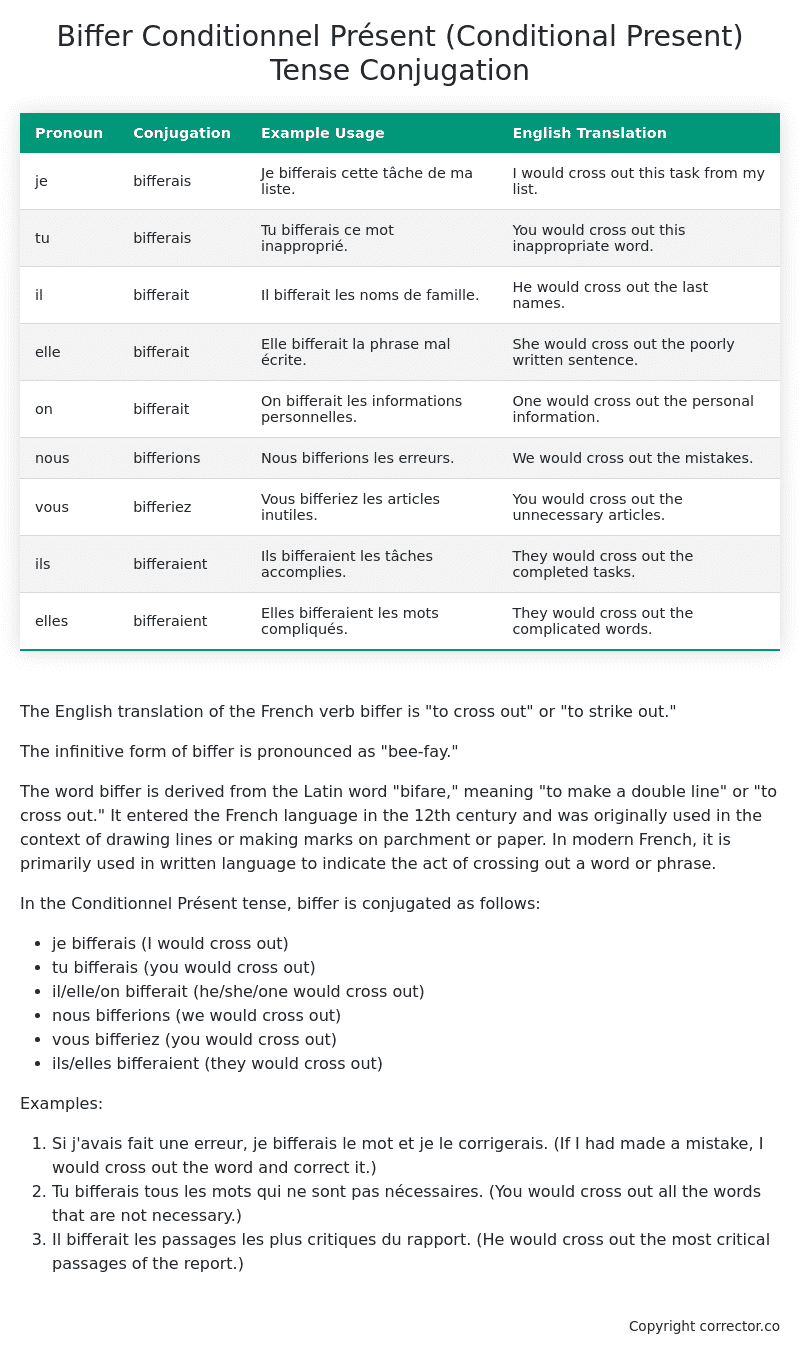Conditionnel Présent (Conditional Present) Tense Conjugation of the French Verb biffer
Introduction to the verb biffer
The English translation of the French verb biffer is “to cross out” or “to strike out.”
The infinitive form of biffer is pronounced as “bee-fay.”
The word biffer is derived from the Latin word “bifare,” meaning “to make a double line” or “to cross out.” It entered the French language in the 12th century and was originally used in the context of drawing lines or making marks on parchment or paper. In modern French, it is primarily used in written language to indicate the act of crossing out a word or phrase.
In the Conditionnel Présent tense, biffer is conjugated as follows:
- je bifferais (I would cross out)
- tu bifferais (you would cross out)
- il/elle/on bifferait (he/she/one would cross out)
- nous bifferions (we would cross out)
- vous bifferiez (you would cross out)
- ils/elles bifferaient (they would cross out)
Examples:
- Si j’avais fait une erreur, je bifferais le mot et je le corrigerais. (If I had made a mistake, I would cross out the word and correct it.)
- Tu bifferais tous les mots qui ne sont pas nécessaires. (You would cross out all the words that are not necessary.)
- Il bifferait les passages les plus critiques du rapport. (He would cross out the most critical passages of the report.)
Table of the Conditionnel Présent (Conditional Present) Tense Conjugation of biffer
| Pronoun | Conjugation | Example Usage | English Translation |
|---|---|---|---|
| je | bifferais | Je bifferais cette tâche de ma liste. | I would cross out this task from my list. |
| tu | bifferais | Tu bifferais ce mot inapproprié. | You would cross out this inappropriate word. |
| il | bifferait | Il bifferait les noms de famille. | He would cross out the last names. |
| elle | bifferait | Elle bifferait la phrase mal écrite. | She would cross out the poorly written sentence. |
| on | bifferait | On bifferait les informations personnelles. | One would cross out the personal information. |
| nous | bifferions | Nous bifferions les erreurs. | We would cross out the mistakes. |
| vous | bifferiez | Vous bifferiez les articles inutiles. | You would cross out the unnecessary articles. |
| ils | bifferaient | Ils bifferaient les tâches accomplies. | They would cross out the completed tasks. |
| elles | bifferaient | Elles bifferaient les mots compliqués. | They would cross out the complicated words. |
Other Conjugations for Biffer.
Le Present (Present Tense) Conjugation of the French Verb biffer
Imparfait (Imperfect) Tense Conjugation of the French Verb biffer
Passé Simple (Simple Past) Tense Conjugation of the French Verb biffer
Passé Composé (Present Perfect) Tense Conjugation of the French Verb biffer
Futur Simple (Simple Future) Tense Conjugation of the French Verb biffer
Futur Proche (Near Future) Tense Conjugation of the French Verb biffer
Plus-que-parfait (Pluperfect) Tense Conjugation of the French Verb biffer
Passé Antérieur (Past Anterior) Tense Conjugation of the French Verb biffer
Futur Antérieur (Future Anterior) Tense Conjugation of the French Verb biffer
Subjonctif Présent (Subjunctive Present) Tense Conjugation of the French Verb biffer
Subjonctif Passé (Subjunctive Past) Tense Conjugation of the French Verb biffer
Subjonctif Imparfait (Subjunctive Imperfect) Tense Conjugation of the French Verb biffer
Subjonctif Plus-que-parfait (Subjunctive Pluperfect) Tense Conjugation of the French Verb biffer
Conditionnel Présent (Conditional Present) Tense Conjugation of the French Verb biffer (this article)
Conditionnel Passé (Conditional Past) Tense Conjugation of the French Verb biffer
L’impératif Présent (Imperative Present) Tense Conjugation of the French Verb biffer
L’infinitif Présent (Infinitive Present) Tense Conjugation of the French Verb biffer
Struggling with French verbs or the language in general? Why not use our free French Grammar Checker – no registration required!
Get a FREE Download Study Sheet of this Conjugation 🔥
Simply right click the image below, click “save image” and get your free reference for the biffer Conditionnel Présent tense conjugation!

Biffer – About the French Conditionnel Présent (Conditional Present) Tense
Formation
Common Everyday Usage Patterns
Expressing Polite Requests
Expressing Hypothetical Situations
Expressing Doubt or Uncertainty
Interactions with Other Tenses
Present Tense
Past Tense
Future Tense
Conditional Perfect
Summary
Want More?
I hope you enjoyed this article on the verb biffer. Still in a learning mood? Check out another TOTALLY random French verb conjugation!


